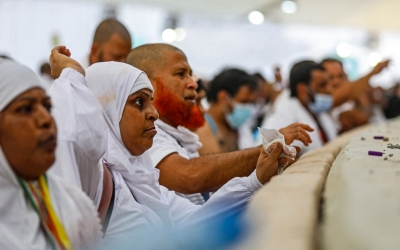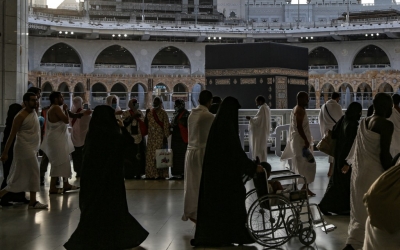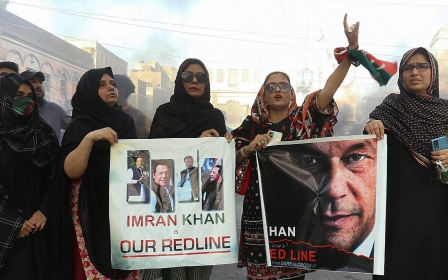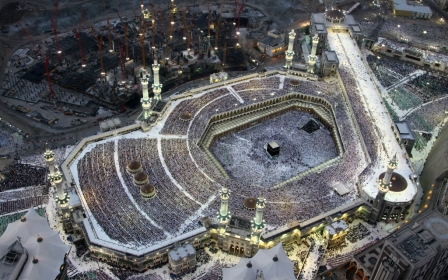Hajj: Why Pakistanis in the West are 'going home' to apply for the pilgrimage
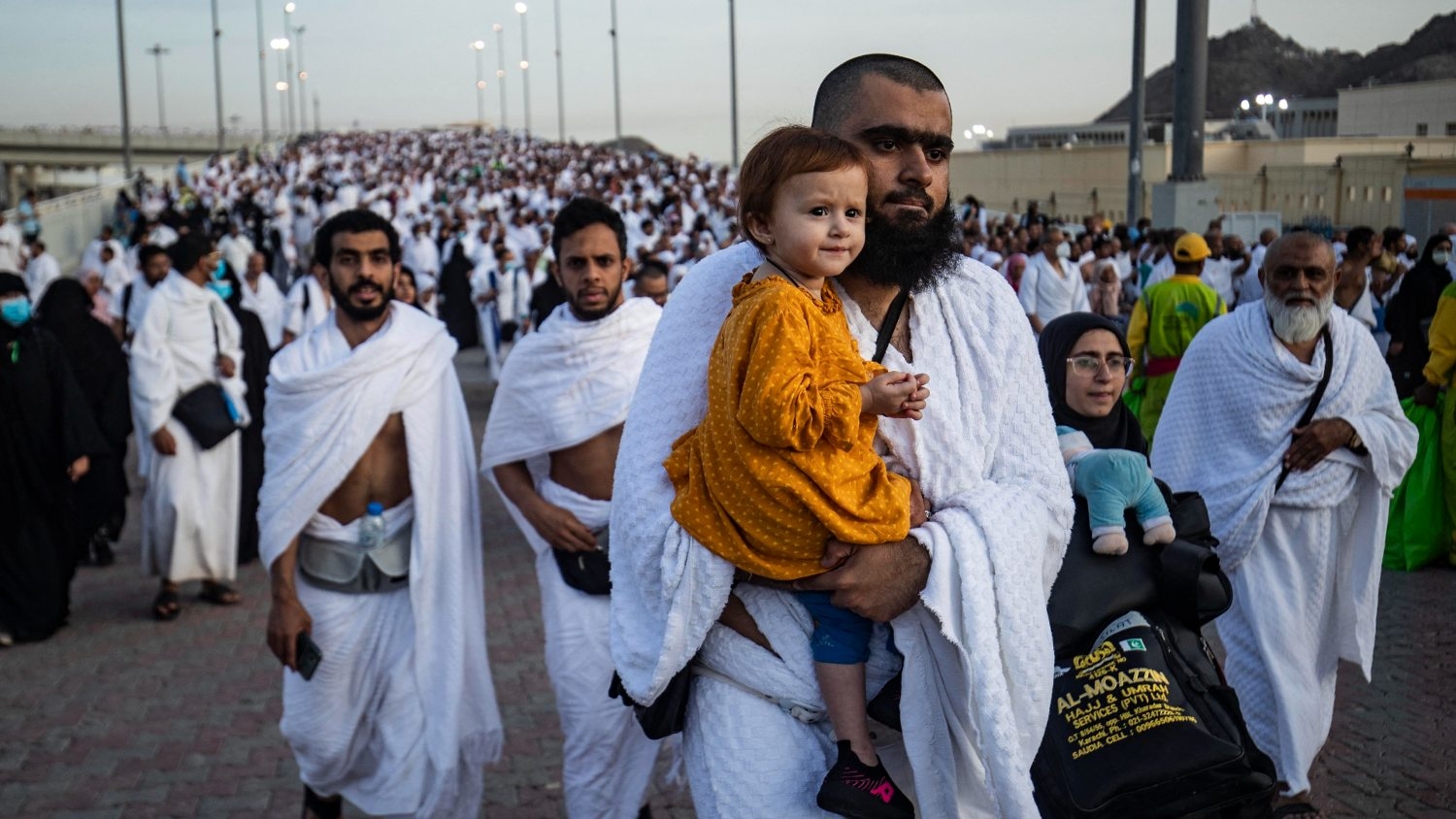
Sitting under a white canopy encrusted with fairy lights at a training session in London for Hajj, Shakil Ahsan listens patiently to the imam as he explains the rites of the pilgrimage in Urdu.
The 42-year-old council worker has dreamed of doing the Hajj pilgrimage for several years, and now his hopes of sitting under a canopy in Mina, Saudi Arabia, are coming to fruition.
The pandemic and inability to book the Hajj through new avenues created by Saudi Arabia had delayed that dream for him and his wife for a few years.
But now Ahsan is taking an alternative route instead of going via the official one designated for British citizens.
This time he's using a Pakistani passport.
New MEE newsletter: Jerusalem Dispatch
Sign up to get the latest insights and analysis on Israel-Palestine, alongside Turkey Unpacked and other MEE newsletters
“We tried to go via the official route of Nusuk, but the website kept freezing on us, and when we did get through, the booking would be sold out or unavailable,” said Ahsan, referring to the new online Hajj application portal Saudi Arabia has implemented for Muslims in the West.
Ahsan is one of many British Pakistanis who are utilising their secondary nationality to circumvent the messy and difficult-to-navigate Hajj application system that was implemented in the western world last year by Saudi Arabia.
"Every day we were looking on [Nusuk], morning to night, even during work at lunchtime breaks and just as soon as I finished work," Ahsan said.
"Then I'd get up in the morning and both me and my wife would try to look for packages and it kept on saying 'packages full', 'packages full'. There was no way to contact them directly."
After waiting days on end, with website crashes and being given minimal choices for packages, Ahsan heard about the possibility of applying for Hajj as a Pakistani citizen.
He and other pilgrims applied for Hajj via Pakistani travel agencies using their Pakistani passports and were able to get packages with much ease, and also for significantly cheaper than their counterparts who applied as British or US citizens.
And this alternative method of applying for Hajj has rekindled hopes for many Pakistanis living in the West who feared they may no longer be able to perform Hajj due to the new system put in place in the US, Europe, and other parts of the western world.
"It's like a dream coming true," said Sumara Athtar, another British Pakistani who has received her Hajj package travel plans from Pakistan.
This new wave of dual Pakistani nationals living abroad and utilising their Pakistani citizenship also poses a number of questions and opportunities for Pakistan itself, with the country facing one of its worst financial crises in history and in dire need of a cash injection.
Applying for Hajj
Last year, Saudi Arabia introduced a new rule that prospective travellers from western countries must book their visits to Mecca through a government website, rather than via travel agencies which had historically been the go-to for obtaining a Hajj package.
As a result, western Muslims were introduced to Nusuk, a portal designed by Saudi Arabia's Ministry of Hajj and Umrah, to handle these packages.
And under this new system introduced by the ministry, the quota of Hajj places allocated to the UK for this year’s pilgrimage was reduced from more than 25,000 to about 3,600.
But Pakistanis in the US, UK and other parts of Europe can avoid this new system by booking a package directly via a licensed agency in Pakistan.
'If someone has a Pakistani passport, and applies in Pakistan, he is treated as a Pakistani'
- Junaid*, a person familiar with Pakistan's Hajj operations
In Pakistan, the country's quota of roughly 180,000 slots is split in half between government-sponsored packages and private ones. The private packages are dispersed among more than 800 licensed travel agencies in the country.
Any Pakistani national can apply for these packages, regardless of whether they live in the country or abroad.
"If someone has a Pakistani passport, and applies in Pakistan, he is treated as a Pakistani," said Junaid*, a person with knowledge of Pakistan's Hajj operations, who spoke on condition of anonymity.
Pakistan is a country that allows for dual citizenship, and any individual whose parents or grandparents were born in Pakistani territory is able to apply for a passport and a national identity card, even if they've never been to the country.
Junaid* added that for foreign nationals applying through Pakistan, there are a number of factors that make it an attractive option.
"There are so many options in Pakistan, and it becomes much more convenient," he said.
"You could come to Pakistan a few weeks early, spend time with your family, and then go to Hajj. It’s a cost consideration and a family consideration."
Given that anyone with Pakistani nationality and a passport can apply for Hajj in the country, it means that Pakistanis not just in the UK or the US, but anywhere outside of Pakistan, are able to apply - including those in Europe and other western countries who now have to deal with the Nusuk portal.
And even though they are applying through Pakistan, they are able to travel directly to Saudi Arabia without having to stop in the country first, adding an extra layer of convenience.
One of world's weakest passports
Those who spoke with Middle East Eye about doing Hajj using their Pakistani nationality never thought in their entire lives that they would ever have a need for a Pakistani passport, as it ranks as the fourth weakest passport in the world.
"I consider myself, like, half Pakistani anyway, because I was born there and I was there until the age of 11," said Athtar, who is taking her 21-year-old son with her on Hajj.
"I know how to read Urdu even though I have forgotten how to write it. But as far as my kids are concerned, no, I never imagined that I would need to make their passport."
Using a second passport also came as a concern for Ahsan, who watched in fear and shock when Shamima Begum, a British citizen, had her British identity stripped away by the government and is not allowed to return to the country.
Begum is currently in northeastern Syria being held in a camp for the families of suspected IS fighters and people fleeing Islamic State (IS) group-held territory, as western-backed Kurdish-led forces defeated the militant group.
"I did [have hesitancies] because I was thinking 'what does it mean if I have dual nationality'? It's that kind of thing for me. There was no support from anyone really here," said Ahsan.
Nusuk woes
For Aymen and Khadija Toor, a Pakistani-American couple living in the US, it was the horror stories that deterred them from even attempting to go through the Nusuk application for Hajj. They had made up their minds last year that they'd be applying through a Pakistani agency.
It was their first time planning to go on Hajj, a lifelong dream of theirs, and they didn't want to worry about any last-minute issues or the worst-case scenario of them being dropped from Nusuk's Hajj application altogether.
"Once the quota system got introduced, we came to know of a number of bad stories in terms of how the site operates, how difficult it is to navigate, you don't know what's happening. And last minute you come to know that okay, it did not come through," said Aymen.
"So this option came up where we can actually go through our homeland, Pakistan, as long as we have the passports. And we immediately jumped on this option."
On top of the ease with which they were able to obtain a Hajj package through Pakistan, going this route has an added bonus for them as it allows Aymen's parents, who are currently in Pakistan, to join them in the same group performing the pilgrimage.
"I'm taking my parents as well. So I just wanted less anxiety at the last minute," Aymen said.
He said that booking Hajj this way was similar to how pilgrims would apply for Hajj in the US prior to the implementation of the quota system.
"It's happening because of the quota reason, and people want more assurance," he said. "And these providers, we used to have them in the US, but now all of that has stopped. So people are kind of fending for themselves."
Aymen, a 50-year-old managing partner at a consulting firm, and Khadija, a 45-year-old paediatrician, spoke to Middle East Eye on their way to the airport.
The couple enjoyed the experience of applying through Pakistan, which they said had allowed them to avoid a lot of stress and worry that others they know had experienced from applying through the US.
Now they can just focus on the pilgrimage, which in and of itself will be a gruelling but rewarding experience.
"There's a mental part of it, right? Physically I think we're ready for it - we have all the vitamins and Aleve. Now we just have to focus on the mental part." said Khadija.
The future of Hajj in Pakistan
While foreign Pakistani citizens are enjoying being able to secure a spot in this year's Hajj thanks to their dual nationality, Pakistan is also taking a close look at this new phenomenon.
It poses both potential opportunities for the country to capitalise on but also creates some problems down the line, as now there may be more competition when it comes to applying for Hajj in Pakistan.
"It’s a very good idea where a Hajj agency could offer another package where they could tour Pakistan," Junaid* told MEE.
"Once you are dealing with the private sector, you have a lot of flexibility. Someone might want to get some medical procedures done, and from there go onto Hajj."
While opportunities exist to expand tourism via Hajj, Pakistan is also facing a major financial crisis that has resulted in a currency devaluation and rising costs, making Hajj increasingly out of reach for the ordinary Pakistani.
Pakistan is facing one of the worst financial crises in its history and is at risk of defaulting because of the massive external debt that it owes. The country's foreign reserves have fallen to around $4bn, an amount roughly equal to one month's worth of imports.
The currency has dropped around 20 percent in value against the dollar this year, while at the same time, the cost of Hajj has risen dramatically.
Junaid* cited rising inflation in the country, coupled with the steep devaluation of the Pakistani rupee as a reason for the drop in Hajj applications.
"It is going to be the first time that Pakistan will be surrendering some of its quota. Usually under the government system, Pakistan would be overbooked by double the amount of slots it has available," he said.
In May, Pakistan announced that it was surrendering 8,000 slots for the pilgrimage - a sign of the country's financial dilemma. It also announced in March that it would be reserving half of its quota for pilgrims paying in US dollars, which was an attempt to bring in more of the US currency into Pakistan's foreign reserves.
In the same vein, Pakistan said in May that it would increase its Hajj quota for overseas Pakistanis applying through the government scheme.
Junaid* added that this year has also been the easiest for Pakistanis living in the West to apply, given the fact that the country has not been able to meet its quota for the first time in history.
"There’s a huge difference in cost, it is much cheaper to go from Pakistan. And they are dual citizens and so they are our citizens as well," he said.
According to Junaid, the cost for a government package was around 250,000 Pakistani rupees in 2016, and now it is around 1.1m rupees (approximately $4,000), pushing the price well out of the reach of an ordinary Pakistani.
But for an American, $4,000 is much less expensive than the packages available on Nusuk, many of which run north of $10,000.
And in the years to come, the financial gap between an American or British Pakistani and one living in Pakistan may continue to widen, raising concerns about who will be able to apply for Hajj.
"Everyone wants to go to Hajj, but finances are the major obstacle," he said.
* Junaid is a pseudonym used to protect this person's identity
Middle East Eye delivers independent and unrivalled coverage and analysis of the Middle East, North Africa and beyond. To learn more about republishing this content and the associated fees, please fill out this form. More about MEE can be found here.



